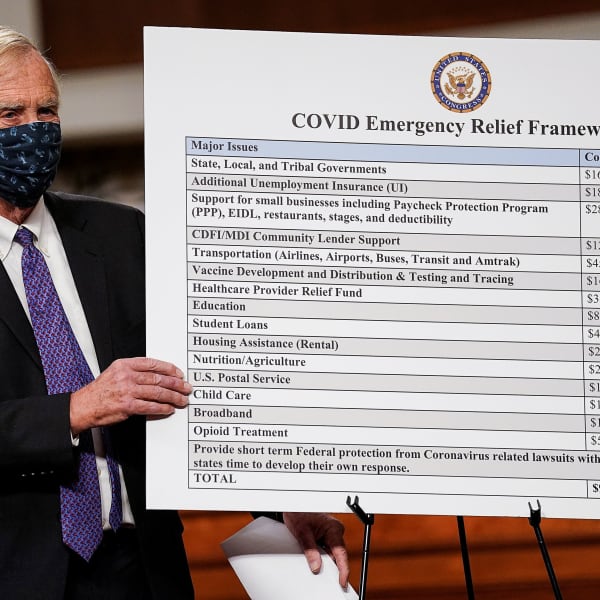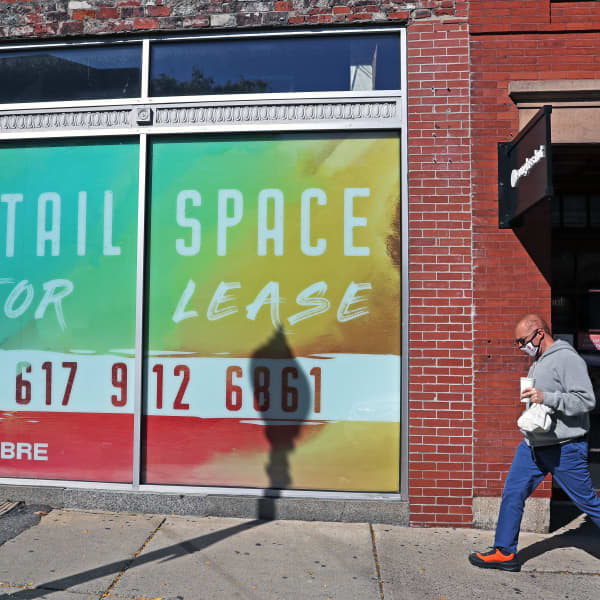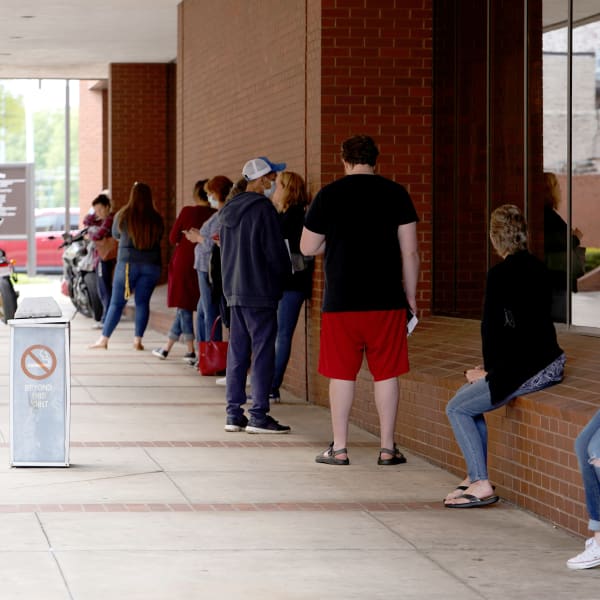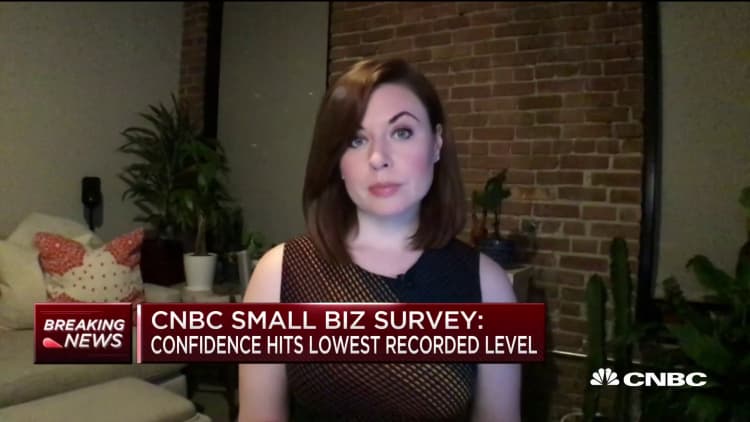
The 30.7 million small businesses on Main Street that generate 50% of U.S. GDP have been hard-pressed to receive the government relief they need to stay in business.
According to the CNBC/SurveyMonkey Small Business Survey released Monday, which surveyed 2,200 small business owners across America, while the $660 billion Paycheck Protection Program was instituted to give them a lifeline through the coronavirus and economic shutdown, only 13% of the 45% who applied for the PPP were approved. Among all respondents, 7% already received financing and 18% are still waiting for a response from a lender.
The experience small business owners have had applying for the $10,000 Economic Injury Disaster Loan Emergency Advance was worse. Only 3% of all small business owners surveyed were approved for such funding, and 16% are awaiting a response from a lender, the survey revealed.
Both relief programs are run by the Small Business Administration. PPP loans are capped at $100,000 per employee and can range in size. The $10,000 advance from EIDL does not have to be repaid, making it effectively a grant.
Sole proprietorships that represent 81% of all small businesses in America is a group particularly hard hit in this credit crunch. For them the window for relief loans opened late, giving them a shorter time opportunity to garner the money desperately needed to ensure they can remain in business.
This lack of aid relief has many on Main Street hemorrhaging red ink. According to the survey, 31% can operate only a few months or less, 7% less than a month and 6% less than a week under the current economic lockdown conditions.
Have you applied for a loan under...
| Application status | Total | 0-4 employees | 5-9 employees | 10-49 employees | 50 or more employees |
|---|---|---|---|---|---|
| Have not applied to the Paycheck Protection Program | 55% | 69% | 24% | 20% | 23% |
| Tried to apply but ran into problems with the Paycheck Protection Program | 11% | 11% | 12% | 10% | 4% |
| Applied to the Paycheck Protection Program | 33% | 18% | 63% | 68% | 72% |
| Have not applied to the economic injury disaster program | 71% | 77% | 56% | 60% | 61% |
| Tried to apply but ran into problems with the economic injury disaster program | 6% | 6% | 7% | 5% | 1% |
| Applied to the economic injury disaster program | 21% | 15% | 35% | 33% | 35% |
Source: Source: CNBC | SurveyMonkey Small Business Survey
According to Rohit Arora, CEO of Biz2Credit, an online lending platform for small business loans, there were multiple problems with the first round of disbursements. "The law was murky, and both applicants and bank loan officers were ill-equipped to process the data, as requirements were changing so fast."
Rocky loan rollout
"Another issue is the fact that as a general rule, large banks haven't focused on small business loans given to companies with less than 50 employees," Arora says. "They have deemed it too labor intensive."
Small community banks also faced issues. Many were ill-equipped to handle a deluge of applications and process large amounts of data into their systems in a short time frame, he notes.
Biz2Credit has already processed $1.6 billion in PPP loans. To date, the average loan size has been $170,000.
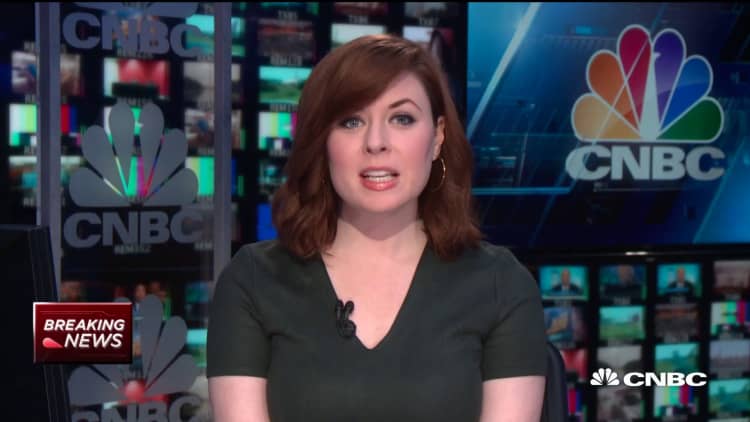
Karen Kerrigan, CEO of the Small Business & Entrepreneurship Council, says the regulations imposed on borrowers under the PPP has also been a challenge, and many business owners have decided not to tap the program for that reason. Among them: the 25/75 rule that says business owners must use 75% of the funds they receive only for payroll, and 25% for rent, mortgage payments, utilities and other operating expenses in order to get loan forgiveness.
"In many cases this has been a deal breaker. Rent and other operating expenses are high, and getting only a quarter of the loan to cover those costs is not enough," she explains.
Another requirement for loan forgiveness is that business owners have eight weeks to bring back employees after the money hits their bank accounts. "What happens to those small business owners operating in hard-hit places like New York and New Jersey, where stay-at-home orders are still in place and no one knows when the shutdown orders will be lifted?" she says.
The small business struggle for survival
The regulations may be one reason 55% of small businesses in the CNBC/SurveyMonkey survey opted not to apply for PPP loans, and 71% did not apply for an Economic Injury Disaster loan.
"Many small business owners just didn't like the model and knew they could not abide by the rules," Kerrigan says.
"One bright spot is the fact that fintech companies like Square, PayPal, Intiuit, Kabbage and others are now authorized lenders of the PPP program. These companies serve millions of small business owners, many of whom are sole proprietorships and mom and pops. They have the AI and advanced technology to process these loans, as well as strong relationships with many borrowers who regularly use their concierge-type services."
Teodor Panterov, founder of Central Park Tours and Broadway Pass in New York City can attest to that. He was rejected twice for a PPP loan from Chase and was finally approved last week for a $22,300 loan after applying through Square. That was half of the loan amount he applied for. All of the funds will be applied to payroll for his 26 workers that had to be furloughed. The loan is not enough to help him pay for anything else, such as rent, which collectively is $20,000 a month for his four locations.
Having to wait weeks for loans to be processed because of filing and processing difficulties has been another challenge for small business owners. Chris Guerrero, founder and president of Westchester Fit, a boutique fitness training business in White Plains, New York, has lost 20% of his revenue since it had to close on March 16. He was one of the first to apply for a $72,600 PPP loan through Blue Ridge Bank, a small community bank, but he experienced application and filing delays. On April 30 he received an etran number, so he is hopeful now.
"At best I will receive the money mid-May, but I still don't know how much money I have been approved for. Application requirements kept changing from the first day the PPP program was launched, causing a lot of confusion. It's been a mess."
Now he is worried about the future. To keep afloat, he has moved fitness classes online, but in the months ahead he is not sure that if this continues, it will be worth it. "I didn't spend 10 years building a thriving business only to see revenue plummet and be at half capacity. If this coronavirus lockdown continues through the summer, I may decide to close shop."
Nancy Sinoway, owner of Tailoring and Alterations Studio in Port Washington, New York, who employs six people, has had a similar experience. So far, she has not been able to raise any PPP funding. To survive she's pivoted from making garments for proms and weddings to making custom face masks.
The hiccups with the government rollout of aid to small business has many tempers flaring, and the fact that large companies like Shack Shack, the Kennedy Center and others tapped the program has made those feelings worse.
"The PPP program is helping a lot of businesses, but the selection process is inherently flawed. The government should have given banks better guidance, and perhaps separate tranches of capital, for small businesses versus mid-size and very large companies," says Eric Lochtefeld, co-founder of Bliss Champions, a small business incubator in Silicon Valley and the owner of over a dozen small businesses. He was unable to raise PPP financing but was able to get $24,000 in EIDL loans for six of his businesses that generated millions prior to the economic shutdown.
"As a small business owner, hearing that the L.A. Lakers got $4.6 million dollars is like a stab in the heart, and not just because I am a Warriors fan but because they are a very large business at a $4 billion market cap," he says.
"As a small business owner, the EIDL program felt like a PR stunt so politicians in D.C. could say, 'Hey look, we did something!' and get some brownie points. We all thought we were applying for a serious loan program, only to be thrown $1,000 per employee with up to a $10,000 limit and then be redirected to PPP. It felt a lot like being handed a tiny Band-Aid for a gaping wound that requires a tourniquet and some morphine."
Kerrigan is hoping that the learning curve in Washington has progressed and that if another tranche of money is disbursed through the PPP, the process will be easier and more equitable. "What we need to do is help those small businesses that have fallen through the cracks. They are vital to our local communities and economy."
On Sunday, National Economic Council Director Larry Kudlow said the White House has made no decision on providing further funding for the emergency loan program for small businesses impacted by the coronavirus pandemic, but said a third round might be necessary.
The CNBC|SurveyMonkey Small Business Survey for Q2 2020 was conducted across 2,200 small business owners between April 21-27. The survey is conducted quarterly using SurveyMonkey's online platform and based on its survey methodology. The Small Business Confidence Index is a 100-point score based on responses to eight key questions. A reading of zero indicates no confidence, and a score of 100 indicates perfect confidence. The modeled error estimate for this survey is plus or minus 2.5 percentage points.


